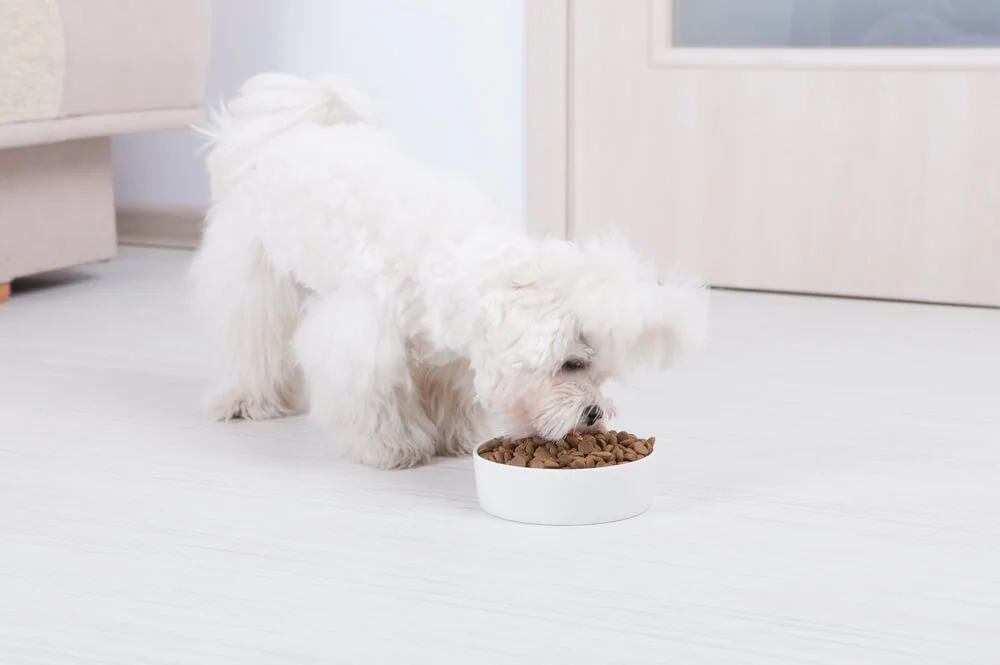Did you know that the best food for a Maltese puppy is one that meets their specific nutritional needs? These adorable little dogs have a delicate digestive system and require a balanced diet to ensure their growth and overall health. Choosing the right food for your Maltese puppy is crucial in providing them with the nutrients they need to thrive.
When it comes to the best food for Maltese puppies, it’s important to consider their unique requirements. Maltese puppies have high energy levels and need a diet that is rich in protein and healthy fats to support their growth and development. Additionally, their small size means portion control is key to prevent obesity. Look for high-quality puppy food that is specifically formulated for small breeds and meets all the necessary nutritional guidelines. Taking the time to select the right food for your Maltese puppy will contribute greatly to their overall well-being and happiness.

The Best Food for Maltese Puppies: A Guide to Healthy Nutrition
Maltese puppies are adorable, tiny bundles of joy that require special attention when it comes to their nutrition. Providing them with the best food is essential for their growth, development, and overall well-being. In this article, we will explore the ideal diet for Maltese puppies, focusing on their specific nutritional needs and recommended food choices. Whether you’ve just welcomed a Maltese puppy into your home or are considering getting one, read on to discover how to give them the best start in life.
Understanding the Nutritional Needs of Maltese Puppies
Proper nutrition is vital during a Maltese puppy’s early stages of life when they are experiencing rapid growth and development. Their small size and high energy levels require a diet that is rich in essential nutrients, proteins, vitamins, and minerals. A balanced diet will support their immune system, maintain healthy skin and coat, promote strong bones and muscles, and provide them with the energy they need for play and learning.
A suitable food for Maltese puppies should have a high-quality protein source, such as deboned chicken, turkey, or fish, as the main ingredient. Look for brands that specifically cater to small breed puppies and follow the guidelines provided by reputable veterinary associations or organizations. Additionally, consider their life stage and any specific health concerns, as some Maltese puppies may have allergies or sensitivities that require a specialized diet.
The Importance of High-Quality Proteins
Protein is an essential component of a Maltese puppy’s diet, as it plays a crucial role in their overall growth and development. High-quality proteins provide the necessary amino acids needed for tissue repair, muscle development, and the production of enzymes and hormones. When selecting a food for your Maltese puppy, ensure that the protein source is clearly identified and is from a reputable brand that uses natural ingredients without fillers or by-products.
Amino acids, which are the building blocks of proteins, are categorized as essential and non-essential. Essential amino acids cannot be produced by the body and must be obtained through the diet. Non-essential amino acids, on the other hand, can be produced by the body and are not required in the diet.
Choosing the Best Food for Maltese Puppies
With countless options available in the market, it can be overwhelming to choose the best food for your Maltese puppy. To make an informed decision, consider the following factors:
1. Protein Content: Look for a food that contains a minimum of 30% protein, with high-quality sources like deboned meat, fish, or poultry listed as the first ingredient.
2. Small Kibble Size: Maltese puppies have tiny mouths, so opt for a food with small kibble size to facilitate easier chewing and digestion.
3. Proper Nutrient Balance: Ensure the food contains an appropriate balance of proteins, fats, carbohydrates, vitamins, and minerals to meet your Maltese puppy’s specific needs.
Benefits of a Balanced Diet
Providing your Maltese puppy with a balanced diet has numerous benefits. First and foremost, it supports their overall health and well-being by meeting their nutritional needs. Secondly, a proper diet helps to prevent common health issues such as obesity, dental problems, and poor coat quality. Lastly, feeding your Maltese puppy high-quality food can contribute to their longevity and quality of life, as a healthy diet lays the foundation for optimal growth and development.
Feeding Tips for Maltese Puppies
Feeding a Maltese puppy requires a few additional considerations due to their small size and delicate digestive systems. Here are some tips to ensure they receive proper nutrition:
1. Feed Small, Frequent Meals: Maltese puppies have small stomachs, so it’s best to feed them several small meals throughout the day rather than a few large ones.
2. Avoid Overfeeding: Maltese puppies can easily gain weight, so be mindful of portion sizes and monitor their body condition to ensure they stay at a healthy weight.
3. Provide Fresh Water: Always ensure your Maltese puppy has access to clean, fresh water to stay hydrated, especially during hot weather or after physical activity.
Remember, each puppy is unique, and it may take some trial and error to find the best food that suits your Maltese puppy’s needs. Regular visits to the veterinarian can also help monitor their growth and adjust their diet accordingly.
Additional Information on Maltese Puppy Nutrition
Understanding the Key Nutrients for Maltese Puppies
A balanced diet for a Maltese puppy should include the following key nutrients:
1. Proteins: Essential for muscle development and repair.
2. Fats: Provide energy and aid in the absorption of fat-soluble vitamins.
3. Carbohydrates: A source of energy.
4. Vitamins: Necessary for various bodily functions and overall health.
Common Health Issues in Maltese Puppies
While Maltese puppies are generally healthy dogs, they may be prone to certain health issues, including:
1. Dental Problems: Maltese puppies are susceptible to early tooth loss and tooth decay, so proper dental care and a diet that promotes dental health are essential.
2. Hypoglycemia: Small breed puppies, like the Maltese, can be prone to low blood sugar levels. Feeding them small, regular meals can help prevent hypoglycemia.
3. Patellar Luxation: This condition affects the knee joint, causing pain and difficulty in moving. Proper nutrition can help maintain joint health.
By understanding these potential health issues, you can make better food choices and take preventive measures to ensure your Maltese puppy’s well-being.
Conclusion
In conclusion, providing the best food for your Maltese puppy is crucial for their growth, development, and overall health. Understanding their nutritional needs and choosing high-quality, balanced food will support their immune system, promote healthy growth, and prevent common health issues. Remember to consult with your veterinarian for personalized advice and monitor your Maltese puppy’s body condition regularly to ensure they maintain a healthy weight. By nourishing your Maltese puppy with the right food, you are setting them up for a happy and healthy life by your side.
Key Takeaways: What is the Best Food for Maltese Puppy?
- Choose a high-quality puppy food that is specifically formulated for small breeds like Maltese.
- Look for a food that contains real meat as the first ingredient and avoids fillers
- Consider the nutritional needs of your Maltese puppy, including protein, fat, and essential vitamins and minerals.
- Consult with your veterinarian to determine the right portion size and feeding schedule for your Maltese puppy.
- Monitor your puppy’s weight and adjust their food intake accordingly to avoid obesity.
Frequently Asked Questions
Here are some common questions about the best food for Maltese puppies:
1. Should I feed my Maltese puppy dry or wet food?
When it comes to feeding your Maltese puppy, a combination of dry and wet food is usually best. Dry kibble helps promote dental health and strengthens the jaw, while wet food adds moisture and variety to their diet. You can mix both types of food or feed them separately, whichever works best for your puppy. Just remember to choose high-quality brands that provide complete nutrition.
Consulting with your veterinarian is also recommended to determine the specific nutritional needs of your Maltese puppy and to ensure you’re providing a balanced diet. They can give you personalized recommendations based on your puppy’s age, weight, and overall health.
2. What should be the main ingredient in my Maltese puppy’s food?
The main ingredient in your Maltese puppy’s food should be a high-quality source of animal protein, such as chicken, turkey, or lamb. Animal protein is important for proper growth and development, as well as for maintaining a healthy coat and immune system. Look for brands that list a named animal protein as the first ingredient on the label.
Avoid foods that have fillers or by-products as the main ingredients. These can be harder for your Maltese puppy to digest and may not provide the necessary nutrients they need. Always read the ingredient list carefully to ensure you’re making the best choice for your furry friend.
3. How often should I feed my Maltese puppy?
Maltese puppies have small stomachs and high metabolisms, so it’s recommended to feed them small, frequent meals throughout the day. Aim for three to four meals spaced evenly throughout the day to keep their energy levels stable and prevent them from becoming too hungry or too full.
Consulting with your veterinarian is important to determine the best feeding schedule for your Maltese puppy, as it may vary depending on their age, weight, and individual needs. Regular monitoring of their weight and overall health will help you adjust their feeding schedule accordingly.
4. Can I give my Maltese puppy human food as treats?
While it may be tempting to share your food with your Maltese puppy, it’s important to avoid feeding them human food as a regular treat. Many human foods are high in salt, sugar, or other ingredients that can be harmful to dogs. Some foods, such as chocolate, grapes, and onions, can even be toxic.
Instead, opt for specially made dog treats that are nutritionally balanced and safe for your Maltese puppy. You can find a wide variety of treats at pet stores, or even make homemade treats using dog-friendly ingredients. Make sure to read ingredient labels carefully and avoid any treats that contain harmful substances.
5. How can I transition my Maltese puppy to a new food?
If you’re switching your Maltese puppy to a new brand or type of food, it’s important to do it gradually to avoid digestive upset. Start by mixing a small amount of the new food with their current food, gradually increasing the proportion of the new food over a week or two. This slow transition allows their digestive system to adjust to the new ingredients.
Monitor your Maltese puppy’s stool during the transition period and watch for any signs of digestive upset, such as diarrhea or vomiting. If you notice any severe symptoms, consult with your veterinarian for further guidance. Remember, a gradual transition is key to ensuring a smooth change in diet for your Maltese puppy.

Summary
Having a Maltese puppy means you need to provide them with the best food to keep them healthy. The key points to remember are:
1. Choose a high-quality puppy food that is specifically formulated for small breeds like Maltese.
2. Look for ingredients like real meat, fruits, and vegetables, while avoiding fillers like corn or artificial additives.
3. Feed your puppy small, frequent meals to keep their energy levels stable throughout the day.
4. Consult with your veterinarian to determine the right amount of food for your Maltese puppy.
Remember, a well-balanced diet is essential for the growth and overall well-being of your furry friend!
